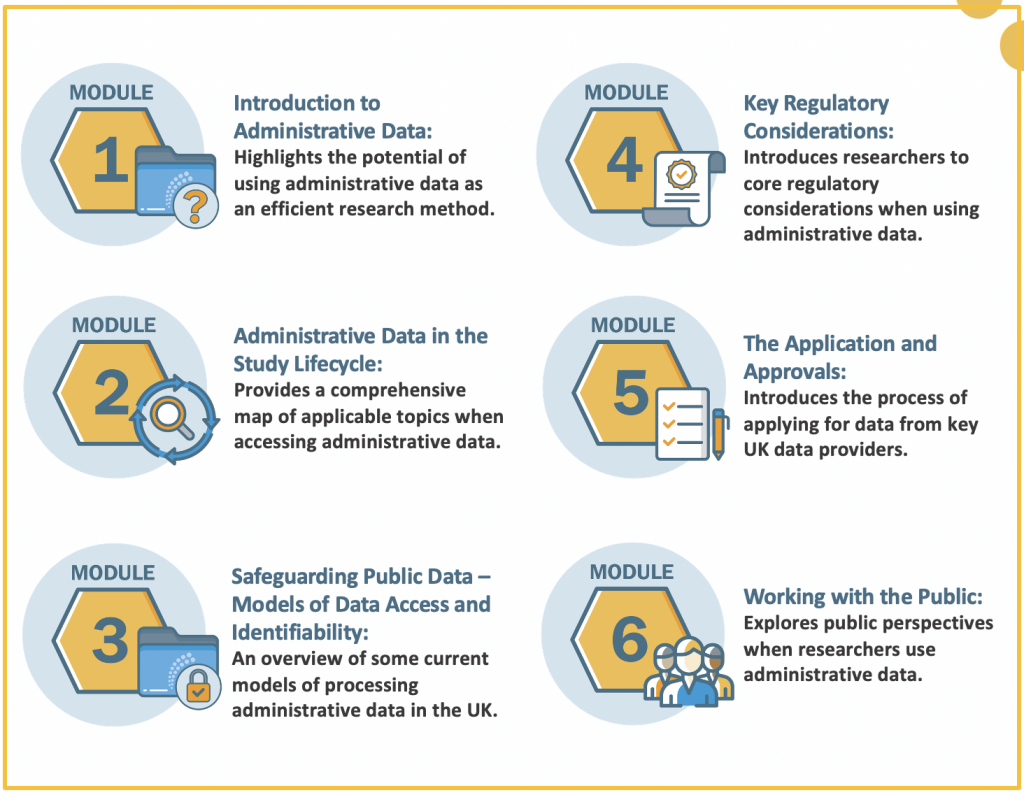CENTRIC Training
20 November 2020

Background
The CENTRIC study is about the development of a co-produced training curriculum for researchers who access and process routine public sector data (administrative data). This involved working with both public and professional stakeholders to develop the course content ensuring it was sensitive to the interests of the public and responsive to the needs of both data providers and UK researchers working with administrative data.
Who were part of the CENTRIC team?
Fiona Lugg-Widger (Study Manager), Kim Munnery (Research Assistant), Michael Robling (Chief Investigator), Julia Townson (Co-Investigator), Rob Trubey (Research Associate).
What is the aim of the study?
To develop training for researchers that enhances their understanding of public perspectives and governance requirements and improves their practice when working with administrative data.
We would hope this training promotes best practice when working with administrative data and provides a solid baseline of understanding in this area of research. The training also provides different perspectives when working with administrative data which should support learning; this includes public views and the challenges that face data providers and researchers in their day-to-day work.
How did you involve the public in this work?
Members of the public were first invited to a workshop hosted by the CENTRIC team to provide their views and perspectives on the use of administrative data in research. These views were then used to inform the training, and includes anonymous quotes used throughout the course for researchers to understand and acknowledge public perspectives.
The same individuals were then invited to a second workshop where we presented our module on working with the public and welcomed feedback on the module, as well as further conversations on working with the public in research.
How does it fit in with routine data?
The online training is for UK researchers working with (or have an interest in) routine public sector data (administrative data).
Why does routine data matter?
Information about individuals is routinely collected whilst providing public services such as health and social care. This record of care or support can be invaluable both to government departments and academic researchers. Analysing such administrative data can help answer important societal questions, for example, about the efficient provision of services, improvements in care, and the impact of policies on patient outcomes.
What is the CENTRIC training about?
The training comprises an online course with six modules ranging from an introduction to administrative data all the way to how to apply for data and how to work with the public.
Who is the training aimed at?
Researchers with varying experience across different sectors in the UK, however early career researchers or researchers with little / no experience on working with administrative data may gain the most benefit.
What does it deliver?

The online course comprises both written content which learners can progress through at their own pace, available resources to download and discussion boards to elicit discussion among learners. The written content uses videos and audio across 6 modules.
A resources section contains all downloadable resources, a glossary, training courses and reference list used throughout the six modules, as well as links to animations and websites of relevance.
What could it facilitate?
- More research studies designed using administrative data
- More efficient research consistent with best practice
- Research conducted and reported in line with public preference and expectations
- Public participants better informed about how administrative data contributes to research, which in turn should increase public trust and confidence in the use of administrative data in research.
How long is the free training running for?
This free training will be available for 6 months once enrolled – Users will have access to all of the modules and resources for this time.
How are you assessing success of the training / study?
- Number of users
- Feedback on the training course
- Number of shares / re-tweets
- Number of organisations who have endorsed
- Module feedback on both content and delivery
- Users’ experience of working with this type of data.
How do people enrol?
Interested individuals can follow this link to the training – https://centric.moodle.school/login/index.php.
See centrictraining.org for more details.
Please share the attached CENTRIC flyer with interested individuals / groups and/or networks.

- December 2025
- October 2025
- June 2025
- May 2025
- April 2025
- March 2025
- February 2025
- December 2024
- November 2024
- October 2024
- September 2024
- July 2024
- June 2024
- May 2024
- April 2024
- March 2024
- December 2023
- November 2023
- September 2023
- July 2023
- June 2023
- April 2023
- March 2023
- February 2023
- December 2022
- November 2022
- October 2022
- September 2022
- August 2022
- July 2022
- June 2022
- May 2022
- April 2022
- March 2022
- February 2022
- January 2022
- November 2021
- September 2021
- July 2021
- June 2021
- May 2021
- March 2021
- February 2021
- December 2020
- November 2020
- September 2020
- August 2020
- July 2020
- January 2020
- December 2019
- October 2019
- September 2019
- July 2019
- June 2019
- May 2019
- April 2019
- February 2019
- December 2018
- November 2018
- October 2018
- September 2018
- August 2018
- July 2018
- June 2018
- May 2018
- April 2018
- March 2018
- December 2017
- October 2017
- August 2017
- July 2017
- June 2017
- May 2017
- April 2017
- March 2017
- February 2017
- January 2017
- December 2016
- October 2016
- August 2016
- June 2016
- April 2016
- March 2016
- February 2016